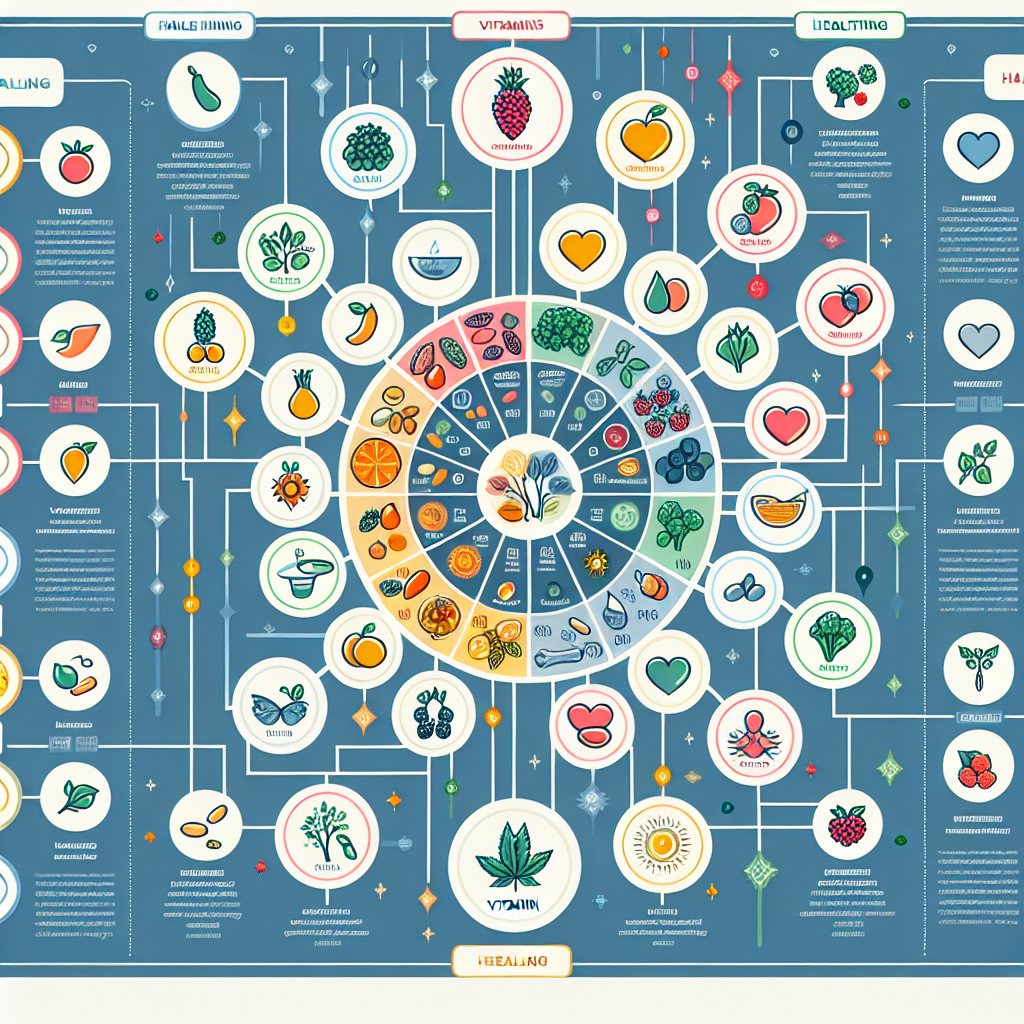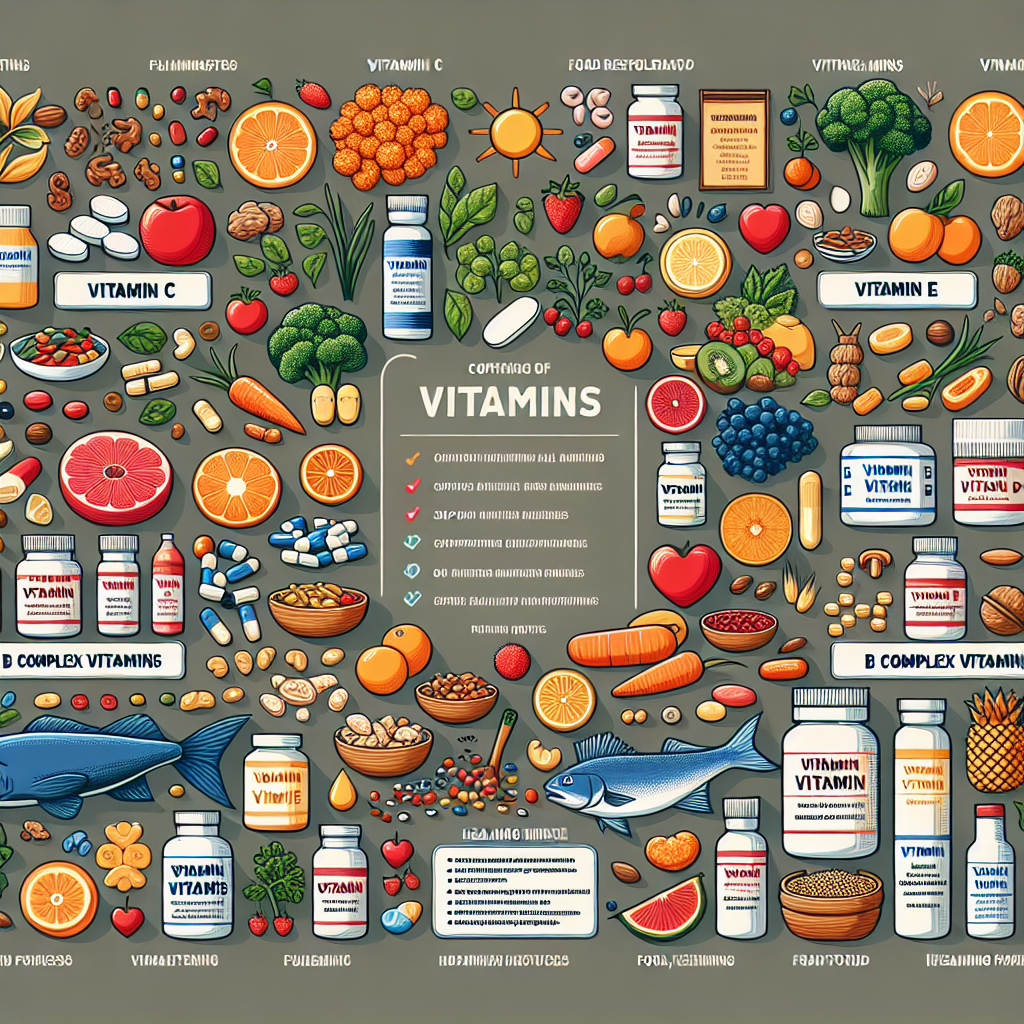Alternative Medicine: Which Vitamins Support Natural Healing?

Discover which vitamins support natural healing in the realm of alternative medicine. Learn more and empower your health journey today. Click here.
Exploring the Role of Vitamins in Natural Healing: A Deep Dive into Alternative Medicine
Alternative medicine has been gaining traction in recent years, with more and more people turning to natural remedies to support their health and wellbeing. One of the key components of this trend is the use of vitamins to support natural healing. Vitamins, as we know, are essential nutrients that our bodies need to function properly. They play a crucial role in maintaining our health, and when used correctly, can aid in the healing process.
Vitamin C is one of the most well-known vitamins for its role in supporting the immune system. It is a powerful antioxidant that can protect our bodies from damage by harmful molecules called free radicals. Vitamin C also aids in the production of collagen, a protein that helps wounds heal. It is found in a variety of fruits and vegetables, including oranges, strawberries, bell peppers, and broccoli.
Another vitamin that plays a significant role in natural healing is Vitamin A. This vitamin is essential for maintaining the health of our skin, the first line of defense against bacteria and viruses. Vitamin A also supports the health of our eyes and our immune system. It can be found in foods like carrots, sweet potatoes, and spinach.
Vitamin E is another antioxidant that can support healing. It helps protect our cells from damage and supports the health of our skin and eyes. Vitamin E can be found in foods like nuts, seeds, and leafy green vegetables.
Vitamin D, often referred to as the “sunshine vitamin,” is also crucial for our health. It helps our bodies absorb calcium, which is essential for bone health. A deficiency in Vitamin D can lead to bone diseases like osteoporosis. Vitamin D also supports our immune system and can help reduce inflammation. Our bodies produce Vitamin D when our skin is exposed to sunlight, but it can also be found in foods like fatty fish and fortified dairy products.
B vitamins, including B6, B12, and folic acid, are also important for natural healing. They support the health of our nerves, help our bodies make new cells, and can reduce inflammation. B vitamins can be found in a variety of foods, including whole grains, beans, peas, and lentils, meat, eggs, and dairy products.
While vitamins can support natural healing, it’s important to remember that they are not a cure-all. They should be used as part of a balanced diet and healthy lifestyle. It’s also important to consult with a healthcare professional before starting any new vitamin regimen, especially if you have a pre-existing health condition or are taking other medications.
In conclusion, vitamins play a crucial role in supporting natural healing and overall health. They are a key component of alternative medicine and can be found in a variety of foods. By incorporating these vitamins into our diets, we can support our bodies’ natural healing processes and promote overall wellbeing. However, it’s important to remember that vitamins are not a substitute for professional medical advice and treatment. Always consult with a healthcare professional before starting any new health regimen.
The Power of Vitamins in Alternative Medicine: Promoting Natural Healing

Alternative medicine has been gaining traction in recent years as more and more people seek natural ways to promote healing and maintain good health. One of the key components of alternative medicine is the use of vitamins, which are essential nutrients that our bodies need to function properly. Vitamins play a crucial role in supporting natural healing, and understanding which vitamins are beneficial for specific health conditions can help individuals make informed decisions about their health.
Vitamin C is one of the most well-known vitamins for its role in supporting the immune system. It is a powerful antioxidant that helps protect our cells from damage caused by free radicals, which are harmful molecules that can lead to chronic diseases. Vitamin C also promotes the production of collagen, a protein that aids in the healing of wounds. This vitamin is abundant in fruits and vegetables, particularly citrus fruits, strawberries, bell peppers, and broccoli.
Another essential vitamin for natural healing is Vitamin A. It is crucial for maintaining the health of our skin, the body’s first line of defense against bacteria and viruses. Vitamin A also supports the health of our eyes and mucous membranes, which are vital for our body’s natural defense system. Foods rich in Vitamin A include carrots, sweet potatoes, spinach, and kale.
Vitamin D, often referred to as the “sunshine vitamin,” is also vital for our health. It plays a significant role in calcium absorption, promoting bone health and helping to prevent conditions like osteoporosis. Recent studies have also suggested that Vitamin D may play a role in supporting our immune system. Our bodies naturally produce Vitamin D when exposed to sunlight, but it can also be found in foods like fatty fish, cheese, and egg yolks.
Vitamin E is another powerful antioxidant that helps protect our cells from damage. It also supports our immune system and aids in the healing of wounds. Vitamin E is found in a variety of foods, including nuts and seeds, spinach, and broccoli.
B vitamins, including B6, B12, and folic acid, are also essential for our health. They support the health of our nervous system, aid in the production of red blood cells, and are crucial for energy metabolism. B vitamins are found in a variety of foods, including whole grains, beans, peas, and lentils, meat, eggs, and dairy products.
While vitamins play a crucial role in supporting natural healing, it’s important to remember that they are just one piece of the puzzle. A balanced diet, regular exercise, adequate sleep, and stress management are all essential for maintaining good health. It’s also important to consult with a healthcare professional before starting any new supplement regimen, as some vitamins can interact with medications or have side effects when taken in large amounts.
In conclusion, vitamins are a powerful tool in alternative medicine, promoting natural healing and supporting overall health. By understanding the role of different vitamins and incorporating them into our diets, we can take a proactive approach to our health and wellbeing. Whether it’s boosting our immune system with Vitamin C, promoting skin health with Vitamin A, supporting bone health with Vitamin D, protecting our cells with Vitamin E, or supporting our nervous system with B vitamins, these essential nutrients are a key component of a holistic approach to health.
Unveiling the Healing Potential of Vitamins in Alternative Medicine
Alternative medicine has been gaining traction in recent years, with more and more people turning to natural remedies to support their health and wellbeing. One area of alternative medicine that has been particularly popular is the use of vitamins to support natural healing. This approach is based on the idea that certain vitamins can help the body heal itself, reducing the need for pharmaceutical interventions.
Vitamins are organic compounds that our bodies need in small amounts to function properly. They play a crucial role in various bodily functions, including metabolism, immunity, and cell growth. While most vitamins can be obtained from a balanced diet, some people may need to take supplements to meet their nutritional needs.
Vitamin C is one of the most well-known vitamins for its role in supporting natural healing. It is a powerful antioxidant that helps protect the body against free radicals, which are harmful molecules that can damage cells and contribute to chronic diseases. Vitamin C also plays a key role in collagen synthesis, which is essential for wound healing. Moreover, it boosts the immune system, helping the body fight off infections and diseases.
Another vitamin that has been linked to natural healing is Vitamin D. This vitamin is unique because our bodies can produce it when our skin is exposed to sunlight. Vitamin D is crucial for bone health as it helps the body absorb calcium. Recent studies have also suggested that Vitamin D may play a role in wound healing and tissue repair. Furthermore, it has been found to have anti-inflammatory and immunoregulatory properties, which could potentially help in managing autoimmune diseases.
Vitamin A is another essential nutrient that supports natural healing. It is vital for maintaining the health of our skin, the first line of defense against bacteria and viruses. Vitamin A also plays a role in the formation and maintenance of healthy teeth, skeletal and soft tissue, and promotes good vision. Additionally, it has been found to support immune function and has antioxidant properties that can help protect the body against damage from free radicals.
Vitamin E, often referred to as the ‘skin vitamin’, is also worth mentioning. It is a potent antioxidant that helps protect the skin from damage caused by free radicals. Vitamin E also supports the immune system and helps keep blood vessels healthy. It has been found to accelerate wound healing and reduce scarring when applied topically.
Lastly, the B-vitamins, a group of eight water-soluble vitamins, play a vital role in maintaining good health and wellbeing. They help the body convert food into fuel, allowing us to stay energized throughout the day. Some B-vitamins, like B6, B9, and B12, are also known for their role in supporting the immune system and promoting brain health.
In conclusion, vitamins play a crucial role in supporting natural healing and overall health. While they should not replace conventional medicine, they can certainly complement it. It’s important to remember that while vitamins can support health, they are not a cure-all. A balanced diet, regular exercise, and a healthy lifestyle are still the cornerstones of good health. Always consult with a healthcare professional before starting any new supplement regimen.